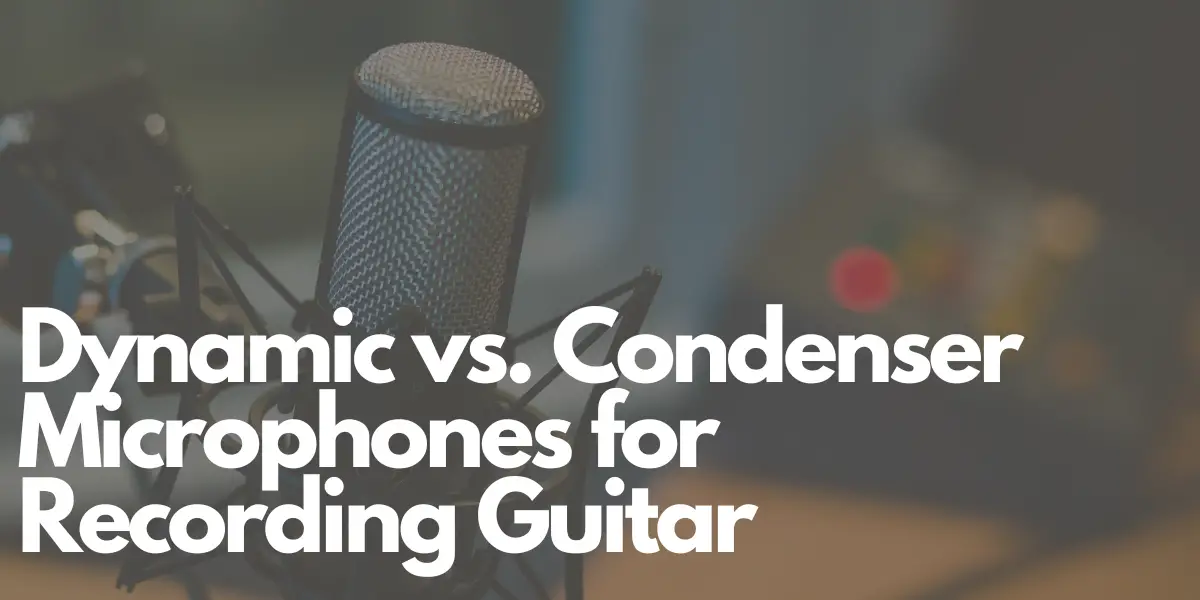When it comes to capturing the soulful sounds of a guitar, the choice between dynamic and condenser microphones can be a bit of a conundrum. Whether you’re a novice musician or a seasoned pro, the dynamic vs. condenser microphone debate is an evergreen topic in the world of music recording. Both mic types have their unique characteristics, and the decision largely hinges on your specific recording needs and personal preferences.
Dynamic Microphones for Guitar Recording
Durability: Dynamic microphones are like the rugged workhorses of the microphone world. They are built to withstand high sound pressure levels (SPLs) and are less prone to damage from accidental drops or rough handling, making them a go-to choice for live performances where things can get a bit rowdy.
Versatility: Dynamic mics are remarkably versatile and can handle a wide array of sound sources, including guitar amplifiers and drums, thanks to their excellent transient response. This versatility makes them a popular choice for various recording situations.
Noise Rejection: Dynamic microphones feature a directional pickup pattern, which is fancy lingo for saying they are good at focusing on the sound you want while rejecting unwanted ambient noise. This quality makes them a perfect choice for isolating the beautiful tones of your guitar.
Cost-effectiveness: If you’re conscious of your budget, dynamic microphones come to the rescue. They are generally more budget-friendly than condenser mics, making them a practical option for many musicians, especially those just starting.
Condenser Microphones for Guitar Recording
Sensitivity: Condenser microphones are the delicate artists in the microphone world. They are incredibly sensitive and can capture the nuances and subtleties of acoustic guitars with remarkable clarity. If you want to hear every whisper of your guitar, a condenser mic is your best friend.
Frequency Response: Condenser microphones offer a broader frequency response compared to their dynamic counterparts. This translates to more detailed and lifelike recordings, making them a favorite in professional studio setups.
Phantom Power: One thing to keep in mind is that condenser microphones require phantom power, which is readily available in most recording setups. This additional power enhances their performance, giving you pristine audio quality.
Studio-quality Recordings: If you’re aiming for that studio-quality sound, condenser mics are often the top choice. They deliver a high level of audio fidelity, capturing every sonic detail your guitar has to offer.
Choosing the Right Mic for Your Guitar
Now that we’ve explored the strengths of both dynamic and condenser microphones, let’s delve into the factors that will help you make the right choice:
Purpose: Think about the context in which you’ll be recording. For live performances where durability is crucial, a dynamic microphone may be more practical. If you’re in a studio setting and want to capture every intricate detail, a condenser mic is likely the better option.
Budget: Your budget plays a significant role in your decision. If you’re just starting out or have limited funds, a dynamic microphone offers excellent value for money. Condenser microphones tend to be more expensive due to their advanced features.
Guitar Type: The type of guitar you’re recording also matters. For acoustic guitars, a condenser microphone is often the preferred choice due to its sensitivity. On the other hand, when recording electric guitars and amplifiers, dynamic mics can work exceptionally well, especially in a live setting.
Room Acoustics: Take into consideration the acoustics of your recording environment. In a controlled studio environment with optimal conditions, a condenser microphone can truly shine. However, if you’re in less-than-ideal acoustic surroundings, a dynamic microphone can help minimize unwanted background noise.
In the dynamic vs. condenser microphone showdown for recording guitars, there’s no one-size-fits-all answer. Both microphone types have their strengths, and your choice should align with your specific needs, budget, and recording environment.
Ultimately, the best microphone for your guitar recording will be the one that complements your musical style and helps you achieve the sonic quality you desire. So, whether you’re strumming acoustic chords or shredding electric solos, choose wisely, and let your music shine through.
Author: Mike P
Hi! My name is Mike! I’ve been an apartment producer/musician for 10+ years. I’ve played in punk bands, released EDM tunes on Beatport and iTunes, and have a semi-successful stock music portfolio. Read more…



